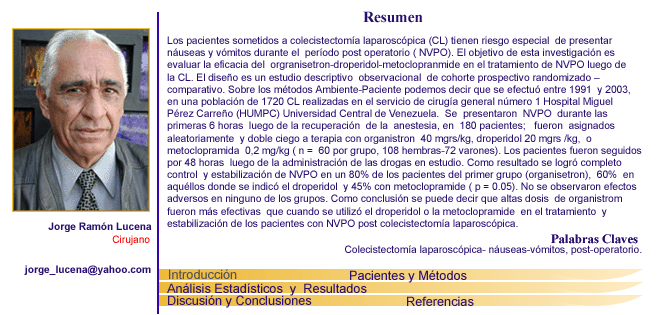



Title
Nausea and Vomiting after Laparoscopic Surgery
Summary
Background: Patients undergoing laparoscopic cholecystectomy (LC) may be especially
at risk of experiencing postoperative nausea and vomiting (PONV).
Objective: To evaluate
the efficacy of orgranisetron –droperidol and metoclopramide for the treatment
of PONV after LC.
Design: Prospective
randomized double blind study.
Setting: Central University
of Venezuela, Hospital Miguel Pérez Carreño, Caracas-Venezuela.
Patients Methods:
After experiencing PONV during the fist 6h after recovery from anesthesia, 180
patients ( 98 women) received, in a randomized double-blind manner, orgranisetron
40ug / kg, droperidol 20ug/kg or metoclopramide 0.2 mg/kg ( n= 80 per group).
Patients were then observed for 48 h after administration of the study drug.
Results: Complete
control of establish PONV, definied as no emetic and no need for another rescue
antiemetic medication, 80 per cent of patients with orgranisetron, 60 per cent
with droperidol and 45 per cent with metoclopramide ( p< 0.05). No clinically
adverse events were observed in any of the groups.
Conclusion: A high
dose orgranisetron was more effective than droperidol or metoclopramide for
the treatment of established PONV after CL.
Introducción
Las náuseas y los vómitos postoperatorios (NVPO) son eventos adversos
que se presentan con relativa frecuencia luego de la cirugía con anestesia
general. (1): Su incidencia se ha señalado entre el 5 al 42% en pacientes
sometidos a CL (2-3)
El granisetron similar al ondansentron, son antagonistas selectivos de los receptores de la hidroxitriptamina tipo 3 ( 5-HT3) de gran efectividad en el tratamiento de estas complicaciones en pacientes que reciben citotóxicos (4). Recientemente ha sido demostrado que el uso profiláctico del gransinsetrom ha resultado efectivo para prevenir NVPO luego de la CL (5)
El propósito de este estudio será evaluar y comparar la eficacia del uso de los antieméticos más comunes gransinsetrom, droperidol y la metoclopramida en el tratamiento de este tipo de complicaciones (NVPO) que aparecen luego de la CL.
![]()